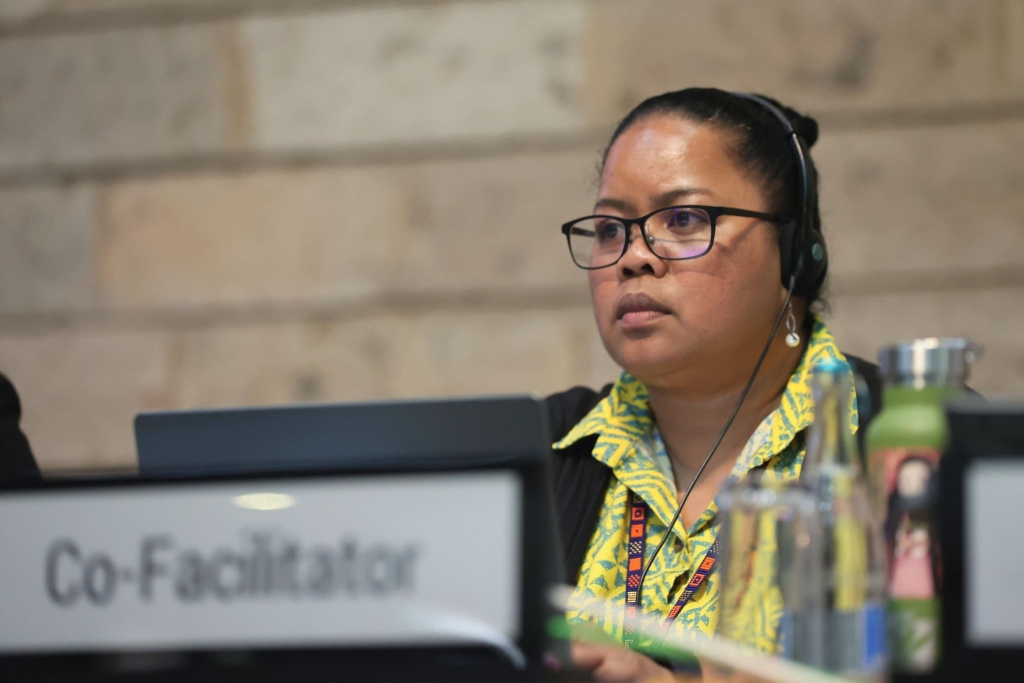
Three-point Q and A with Palau’s Chief Negotiator Ms Gwen Sisior
The fourth session of the Intergovernmental Negotiating Committee to develop an international legally binding instrument on plastic pollution, including in the marine environment (INC-4), is taking place from 23 to 29 April 2024 in Ottawa, Canada.
This week, the Pacific Small Islands Developing States are preparing for the event through a series of meetings, both as PSIDS as well as the Alliance of Small Island States.
Plastic pollution is one of the triple planetary crises declared with climate change and biodiversity loss. Since the 1950’s there has been 9.2 billion tonnes of plastic produced of which 7 billion tonnes has become waste now filling up landfills and polluting our ocean. Unless we act now there will be more plastic than fish in our ocean by the year 2050.
Ahead of the Pacific Islands is the fourth of five negotiations sessions directed to complete a draft instrument by the end of 2024. We spent time with Ms Gwen Sisior, the Chief Negotiator of Palau to learn more about the current state of negotiations for the INC4.

Q: What do you feel are the key issues for the Pacific Small Islands Developing States as we go into the INC4?
A: “I think for the negotiations for PSIDS, we now have to look at the more detailed discussions that are going to happen during INC4. These detailed discussions could include looking into what this would look like in terms of implementation and whether or not this treaty needs to be detailed enough to discuss all of that. I think we also need to understand that we're speaking to a treaty text, and the difference between what a treaty text should look like versus what a Conference of the Parties (COP) decision should be because some of these detailed discussions and resulting text proposals are to me at the level of a COP decision and we dont want to restrict ourselves unnecessarily in the treaty text.”
Q: What do you feel are our challenges ahead in these negotiations?
A: “I think it's going to be really hard for PSIDS. We really need to be prepared and know this well enough to be able to react on the floor because I think things are going to move quite quickly at INC4 to develop this treaty. I think for PSIDS at minimum we need to negotiate to keep our elements in there, especially when it comes to streamlining the text to still maintain and ensure that the elements we want are there. We should not focus too much on deleting anything that opposes our position and leave that to the actual text-based negotiations because that opens a door to others deleting our position from the beginning, so we need to refrain from doing that. We also need to look at both content and strategy because we are not quite at text-based negotiations yet, so we need to keep that in mind. I think there's general agreement that what we have in the revised merged texts is not fit for text-based negotiations. We still have to streamline a lot of these options into a textual format that we can then negotiate. Right now, we're still speaking to elements or the essence of what we would like to see in the treaty.”
Q. What advice would you have for the Pacific Small Islands Developing States moving forward?
A: “I know that the Pacific has always been flexible, we always try to be flexible - I think we need to know when to be flexible and when not to be, but we also need to be more strategic in how we use our flexibility as well. We've always been about content and substance which is very important, but I think considering the way the INCs have been negotiated, strategy is now becoming just as critical as the substance. We need to be more strategic in our way forward.”
The fourth Intergovernmental Negotiating Committee to develop an international legally binding instrument on plastic pollution, including in the marine environment is taking place in Ottawa, Canada, from 23-29 April 2024. The Pacific Islands are represented by the Cook Islands, Federated States of Micronesia, Fiji, Kiribati, Marshall Islands, Nauru, Niue, Palau, Papua New Guinea, Samoa, Solomon Islands, Tonga, Tuvalu and Vanuatu through the support of the Government of Australia and the United Nations. They are supported by the Secretariat of the Pacific Regional Environment Programme (SPREP), working with partners the Pacific Islands Forum Secretariat (PIFS), Office of the Pacific Ocean Commissioner (OPOC), The Pacific Community (SPC), Forum Fisheries Agency (FFA), Environmental Investigation Agency (EIA), Centre for International Environmental Law (CIEL), University of Wollongong, WWF and Massey University.
For more information visit: https://www.unep.org/inc-plastic-pollution/session-4
EIN Presswire does not exercise editorial control over third-party content provided, uploaded, published, or distributed by users of EIN Presswire. We are a distributor, not a publisher, of 3rd party content. Such content may contain the views, opinions, statements, offers, and other material of the respective users, suppliers, participants, or authors.

